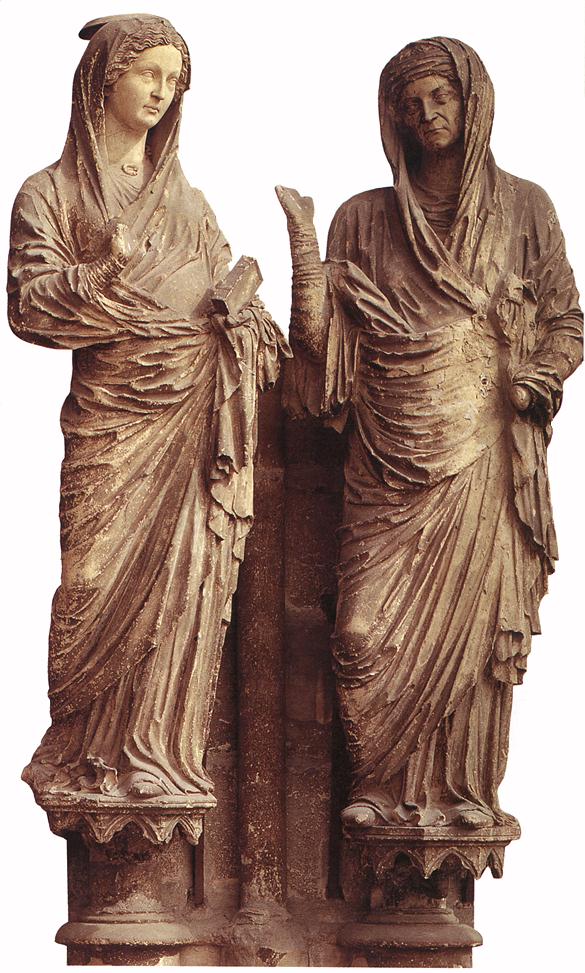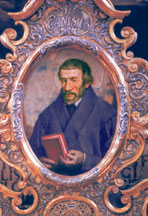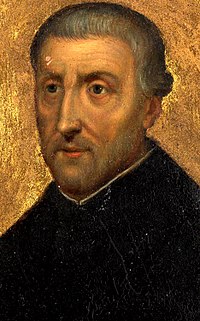Luke CHAP. 1
1:39–45
39. And Mary arose in those days, and went into the hill country with haste, into a city of Juda;
40. And entered into the house of Zacharias, and saluted Elisabeth.
41. And it came to pass, that, when Elisabeth heard the salutation of Mary, the babe leaped in her womb; and Elisabeth was filled with the Holy Ghost:
42. And she spake out with a loud voice, and said, Blessed art thou among women, and blessed is the fruit of thy womb.
43. And whence is this to me, that the mother of my Lord should come to me?
44. For, lo, as soon as the voice of thy salutation sounded in my ears, the babe leaped in my womb for joy.
45. And blessed is she that believed: for there shall be a performance of those things which were told her from the Lord.
AMBROSE. The Angel, when he announced the hidden mysteries to the Virgin, that he might build up her faith by an example, related to her the conception of a barren woman. When Mary heard it, it was not that she disbelieved the oracle, or was uncertain about the messenger, or doubtful of the example, but rejoicing in the fulfilment of her wish, and consicentious in the observance of her duty, she gladly went forth into the hill country. For what could Mary now, filled with God, (plena Deo) but ascend into the higher parts with haste!
ORIGEN. For Jesus who was in her womb hastened to sanctify John, still in the womb of his mother. Whence it follows, with haste.
AMBROSE. The grace of the Holy Spirit knows not of slow workings. Learn, ye virgins, not to loiter in the streets, nor mix in public talk.
THEOPHYLACT. She went into the mountains, because Zacharias dwelt there. As it follows, To a city of Juda, and entered into the house of Zacharias. Learn, O holy women, the attention which ye ought to shew for your kinswomen with child. For Mary, who before dwelt alone in the secret of her chamber, neither virgin modesty caused to shrink from the public gaze, nor the rugged mountains from pursuing her purpose, nor the tediousness of the journey from performing her duty. Learn also, O virgins, the lowliness of Mary. She came a kinswoman to her next of kin, the younger to the elder, nor did she merely come to her, but was the first to give her salutations; as it follows, And she saluted Elisabeth. For the more chaste a virgin is, the more humble she should be, and ready to give way to her elders. Let her then be the mistress of humility, in whom is the profession of chastity. Mary is also a cause of piety, in that the higher went to the lower, that the lower might be assisted, Mary to Elisabeth, Christ to John.
CHRYSOSTOM. (Hom. iv. in Matt.) Or else the Virgin kept to herself all those things which have been said, not revealing them to any one, for she did not believe that any credit would be given to her wonderful story; nay, she rather thought she would suffer reproach if she told it, as if wishing to screen her own guilt.
GREEK EXPOSITOR. (Geometer.) But to Elisabeth alone she has recourse, as she was wont to do from their relationship, and other close bonds of union.
AMBROSE. But soon the blessed fruits of Mary’s coming and our Lord’s presence are made evident. For it follows, And it came to pass, that when Elisabeth heard the salutation of Mary, the babe leaped in her womb. Mark the distinction and propriety of each word. Elisabeth first heard the word, but John first experienced the grace. She heard by the order of nature, he leaped by reason of the mystery. She perceived the coming of Mary, he the coming of the Lord.
GREEK EXPOSITOR. (Geometer.) For the Prophet sees and hears more acutely than his mother, and salutes the chief of Prophets; but as he could not do this in words, he leaps in the womb, which was the greatest token of his joy. Who ever heard of leaping at a time previous to birth? Grace introduced things to which nature was a stranger. Shut up in the womb, the soldier acknowledged his Lord and King soon to be born, the womb’s covering being no obstacle to the mystical sight.
ORIGEN. (vid. etiam Tit. Bos.) He was not filled with the Spirit, until she stood near him who bore Christ in her womb. Then indeed he was both filled with the Spirit, and leaping imparted the grace to his mother; as it follows, And Elisabeth was filled with the Holy Spirit. But we cannot doubt that she who was then filled with the Holy Spirit, was filled because of her son.
AMBROSE. She who had hid herself because she conceived a son, began to glory that she carried in her womb a prophet, and she who had before blushed, now gives her blessing; as it follows, And she spake out with a loud voice, Blessed art thou among women. With a loud voice she exclaimed when she perceived the Lord’s coming, for she believed it to be a holy birth. But she says, Blessed art thou among women. For none was ever partaker of such grace or could be, since of the one Divine seed, there is one only parent.
BEDE. Mary is blessed by Elisabeth with the same words as before by Gabriel, to shew that she was to be reverenced both by men and angels.
THEOPHYLACT. But because there have been other holy women who yet have borne sons stained with sin, she adds, And blessed is the fruit of thy womb. Or another interpretation is, having said, Blessed art thou among women, she then, as if some one enquired the cause, answers, And blessed is the fruit of thy womb: as it is said, Blessed be he that cometh in the name of the Lord. The Lord God, and he hath shewed us light; (Ps. 118:26, 27.) for the Holy Scriptures often use and, instead of because.
TITUS BOSTRENSIS. Now she rightly calls the Lord the fruit of the virgin’s womb, because He proceeded not from man, but from Mary alone. For they who are sown by their fathers are the fruits of their fathers.
GREEK EXPOSITOR. (Geometer.) This fruit alone then is blessed, because it is produced without man, and without sin.
BEDE. This is the fruit which is promised to David, Of the fruit of thy body will I set upon thy throne. (Ps. 132:11.)
GREEK EXPOSITOR. (Severus.) From this place we derive the refutation of Eutyches, in that Christ is stated to be the fruit of the womb. For all fruit is of the same nature with the tree that bears it. It remains then that the virgin was also of the same nature with the second Adam, who takes away the sins of the world. But let those also who invent curious fictions concerning the flesh of Christ, blush when they hear of the real child-bearing of the mother of God. For the fruit itself proceeds from the very substance of the tree. Where too are those who say that Christ passed through the virgin as water through an aqueduct? Let these consider the words of Elisabeth who was filled with the Spirit, that Christ was the fruit of the womb. It follows, And whence is this to me, that the mother of my Lord should come to me?
AMBROSE. She says it not ignorantly, for she knew it was by the grace and operation of the Holy Spirit that the mother of the prophet should be saluted by the mother of his Lord, to the advancement and growth of her own pledge; but being aware that this was of no human deserving, but a gift of Divine grace, she therefore says, Whence is this to me, that is, By what right of mine, by what that I have done, for what good deeds?
ORIGEN. (non occ. vide Theoph. et. Tit. Bost.) Now in saying this, she coincides with her son. For John also felt that he was unworthy of our Lord’s coming to him. But she gives the name of “the mother of our Lord” to one still a virgin, thus forestalling the event by the words of prophecy. Divine foreknowledge brought Mary to Elisabeth, that the testimony of John might reach the Lord. For from that time Christ ordained John to be a prophet. Hence it follows, For, to, as soon as the voice of thy salutation sounded, &c.
AUGUSTINE. (Epist. ad Dardanum 57.) But in order to say this, as the Evangelist has premised, she was filled with the Holy Spirit, by whose revelation undoubtedly she knew what that leaping of the child meant; lamely, that the mother of Him had come unto her, whose forerunner and herald that child was to be. Such then night be the meaning of so great an event; to be known indeed by grown up persons, but not understood by a little child; for she said not, “The babe leaped in faith in my womb,” but leaped for joy. Now we see not only children leaping for joy, but even the cattle; not surely from any faith or religious feeling, or any rational knowledge. But this joy was strange and unwonted, for it was in the womb; and at the coming of her who was to bring forth the Saviour of the world. This joy, therefore, and as it were reciprocal salutation to the mother of the Lord, was caused (as miracles are) by Divine influences in the child, not in any human way by him. For even supposing the exercise of reason and the will had been so far advanced in that child, as that he should be able in the bowels of his mother to know, believe, and assent; yet surely that must be placed among the miracles of Divine power, not referred to human examples.
THEOPHYLACT. The mother of our Lord had come to see Elisabeth, as also the miraculous conception, from which the Angel had told her should result the belief of a far greater conception, to happen to herself; and to this belief the words of Elisabeth refer, And blessed art thou who hast believed, for there shall be a performance of those things which were told thee from the Lord.
AMBROSE. You see that Mary doubted not but believed, and therefore the fruit of faith followed.
BEDE. Nor is it to be wondered at, that our Lord, about to redeem the world, commenced His mighty works with His mother, that she, through whom the salvation of all men was prepared, should herself be the first to reap the fruit of salvation from her pledge.
AMBROSE. But happy are ye also who have heard and believed, for whatever soul hath believed, both conceives and brings forth the word of God, and knows His works.
BEDE. But every soul which has conceived the word of God in the heart, straightway climbs the lofty summits of the virtues by the stairs of love, so as to be able to enter into the city of Juda, (into the citadel of prayer and praise, and abide as it were for three months in it,) to the perfection of faith, hope, and charity.
GREGORY. (super Ezech. lib. i. Hom. i. 8.) She was touched with the spirit of prophecy at once, both as to the past, present, and future. She knew that Mary had believed the promises of the Angel; she perceived when she gave her the name of mother, that Many was carrying in her womb the Redeemer of mankind; and when she foretold that all things would be accomplished, she saw also what was to follow in the future.
Catena Aurea Luke 1





 For a half-century Jesuit Father Peter Canisius led the Catholic Reformation in Austria, Bavaria, and Bohemia. For that reason he is reckoned an apostle to Germany, second only to St. Boniface. With stupendous energy he preached and taught in parishes, reformed and founded universities, wrote many books including popular catechisms, restored lapsed Catholics, converted Protestants, preached retreats, and found time to care for the sick. In his last thirty years traveling more than twenty thousand miles on foot or horseback, St. Peter Canisius spearheaded the renewal of the Catholic faith in southern Germany.
For a half-century Jesuit Father Peter Canisius led the Catholic Reformation in Austria, Bavaria, and Bohemia. For that reason he is reckoned an apostle to Germany, second only to St. Boniface. With stupendous energy he preached and taught in parishes, reformed and founded universities, wrote many books including popular catechisms, restored lapsed Catholics, converted Protestants, preached retreats, and found time to care for the sick. In his last thirty years traveling more than twenty thousand miles on foot or horseback, St. Peter Canisius spearheaded the renewal of the Catholic faith in southern Germany.